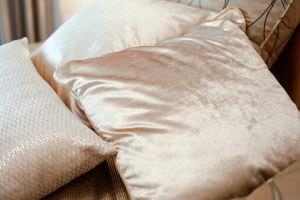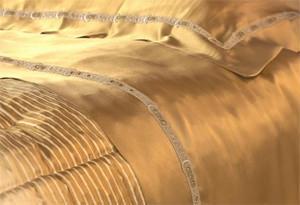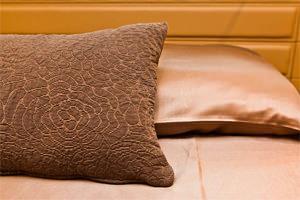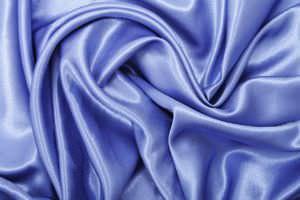Silk linen at home
Post from EditorialsThe silk, together with satin, cashmere and linen, is one of the finest fabrics that you could have at home: with it, the softness and luster are insured.
Silk as a valuable material for the house
 Silk is an animal fiber produced specifically by insects whose larvae, known as silkworms, secrete a filament that gives rise to the cocoon.
Silk is an animal fiber produced specifically by insects whose larvae, known as silkworms, secrete a filament that gives rise to the cocoon.
This filament, even kilometers long, is composed of raw silk that, once processed, give rise to the silk as we know it.
Its origins can be traced back thousands of years before Christ in the Chinese Empire, where it was used for the construction of the garments of the welthiest people; also Italy, around the year 1100, experienced a period of spread of the silk, the processing of which occurred in some specialized centers such as Palermo, Florence and Como.
Unfortunately, with the advent of cotton, and especially of the synthetic fibers that look like silk, with production costs significantly lower, the same has lost a considerable share of the market.
And it is precisely because of the cost of production that it is associated with the silk clothes or luxury liners; today is used in clothing, in furnishings and medicine.
At home, the wider application of the silk is in the upholstery and linen: especially in the bedroom where you want to give a touch of elegance to the environment, the silk is used to cover bed and pillows or as material for upholstery.
If once the furnishings in silk was associated with a baroque style, redundant, typical of the stately homes, it is now possible to buy silk fabrics with textures and patterns in contemporary style, without exceeding in splendor. For those who do not like excess, just provide the environment of one or two pieces of silk which give light and are synonymous with warmth and welcome.
Silk linen for the house
Silk, for the reasons described above, is associated with the luxury: buying silk fabric means investing money in a product that is the result of hours and hours of work.
The most widespread application you have in the sheets, due to its softness and shine, as well as its thermal properties and anti-allergic.
There are several Italian companies, despite the crisis, pointing to the Made in Italy and carry out the production of fabrics that are large market in the luxury sector, Italian and foreign, or simply those who want to provide feedback in their own room at least one refined piece.
That is how sheets, bedspreads, cushion covers or upholstery are covered with the typical sheen of silk.
 Oronotte from Como is a company specialized in the production of household linen in pure silk or cotton sateen; attention over the use of raw materials and manufacturing techniques, the company continually searching for new grounds, shapes and patterns to put on the market products of excellent quality and up to date.
Oronotte from Como is a company specialized in the production of household linen in pure silk or cotton sateen; attention over the use of raw materials and manufacturing techniques, the company continually searching for new grounds, shapes and patterns to put on the market products of excellent quality and up to date.
Full bed linen and duvet cover complete with cotton satin and silk, quilts and bedspreads, blankets and plaid cashmere and cotton are just some of the products they sold all branded Seri.co mark of quality assurance which ensures that the fabric does not contain and does not emit substances harmful to health and which is manufactured in compliance with precise ethical, social and environmental codes. Also Gentili Mosconi Home is from Como, Italian district important for the production of silk fabrics, and we speak of another company specializing in the production of textile products of high quality, made in Italy: silk, linen, cashmere are some of the quality materials used for household linen, but also of the boat.
Also Gentili Mosconi Home is from Como, Italian district important for the production of silk fabrics, and we speak of another company specializing in the production of textile products of high quality, made in Italy: silk, linen, cashmere are some of the quality materials used for household linen, but also of the boat.
Focusing on quality, therefore, the market expanded, turning even abroad, with a booming market in Russia and in the Middle East.
Cleaning silk bedding for the house
 Silk is a very delicate material and you should never machine wash it together with other clothes.
Silk is a very delicate material and you should never machine wash it together with other clothes.
To maintain the long-gloss typical of silk is advisable to wash the fabric by hand with neutral detergent (in the market there are different types, specifically for delicate fabrics).
Once the wash is done, it is necessary to stanch the same, without wringing, thus avoiding spoiling the plot and without exposing it to direct sunlight during drying.
The last step is ironing that must be done by interposing between the iron and the fabric a cloth that acts as a filter and avoid the silk to be damaged due to excessive heat.
79390 REGISTERED USERS










